Economy
US economy shrinks by 0.5% in Q1, more than initially estimated
The U.S. economy contracted more than previously estimated in the first three months this year, according to fresh government data released on Thursday, with consumer spending and exports both weaker than expected.
U.S. gross domestic product (GDP) decreased at an annual rate of 0.5% in the first quarter, according to the Department of Commerce.
This was down from an earlier estimate of a 0.2% decline, and lower than the 2.4% increase in the fourth quarter last year.
The data came after an import surge that was triggered by U.S. President Donald Trump’s sweeping tariffs since returning to the White House this year.
Businesses had stockpiled goods to try and get ahead of Trump’s levies targeting most trading partners, especially goods from China.
Imports are a subtraction in the calculation of GDP.
But the revision on Thursday mainly reflected “downward revisions to consumer spending and exports,” said the Commerce Department.
This was partly offset by a downward revision to imports, the department added.
While Trump has backed off or postponed some of his most punishing trade salvos as trade negotiations are ongoing, a July deadline approaches for higher tariff levels to kick in for dozens of economies, adding to uncertainty in the economy.
Economy
Top NGO organizes trade facilitation meeting between Türkiye, UK
A leading Turkish nongovernmental organization (NGO), the Independent Industrialists and Businessmen Association (MÜSIAD), organized on Wednesday a roundtable at Britain’s House of Lords to facilitate trade between the two countries and to discuss mutual opportunities for cooperation.
Hosted by Baroness Uddin, a member of the House of Lords, the upper chamber of the British Parliament, the roundtable, titled “Business Without Barriers: Removing Obstacles in U.K.-Türkiye Trade,” was attended by over 10 members of Parliament as well as businesspeople, investors and sector representatives from both countries.
Speaking at the meeting, where representatives of MÜSIAD U.K. were also present, MÜSIAD President Burhan Özdemir said Türkiye is a strategic partner for the U.K. with its strong industrial infrastructure, production capacity and geographical advantages.
“Türkiye is a natural bridge between Europe, Asia and the Middle East. We combine this advantage with production, exports and entrepreneurship,” he said.
Noting that MÜSIAD represents approximately 35% of Türkiye’s trade and industrial production with more than 14,000 members and more than 60,000 companies, Özdemir emphasized that making the free trade agreement (FTA) between the two countries more inclusive is vital not only for trade but also for long-term strategic cooperation.
“When the U.K.’s strength in service exports is combined with Türkiye’s growth potential in this field, it will be possible to produce mutual benefits in digital, financial and professional services. As MÜSIAD, we are ready to actively contribute to this process,” he said.
MÜSIAD U.K. Chairperson Türkan Akbaş highlighted that the current FTA only covers trade in goods and that the exclusion of areas such as services, investment protection, public procurement, digital trade and mutual recognition of professional qualifications from the agreement is particularly challenging for small- and medium-sized enterprises (SMEs).
Explaining that the complexity of visa processes, inequality in access to public tenders and obstacles in mutual service provision cause the economic potential between the two countries to remain below its maximum potential, Akbas made the following assessments: “In 2024, bilateral trade reached 27.8 billion pounds ($38 billion). With comprehensive modernization, this figure could increase by 25%. The U.K.’s financial and digital strength combined with Türkiye’s manufacturing capability can build a much stronger economic architecture.”
“The scope of the FTA should be expanded and the negotiations should be completed quickly for human mobility, knowledge sharing and a trust-based partnership between the two countries.”
Türkiye’s Ambassador to the U.K. Osman Koray Ertaş delivered the opening speech at the event, where British MP and U.K. Trade Representative to Türkiye Afzal Khan emphasized the need to make trade more inclusive.
Özlem Bacak, secretary-general and trade investment advisor of MÜSIAD U.K., said that the modernization of the FTA is an environmental as well as economic necessity and that green production, environmental standards and circular supply chains should be included in the scope of the agreement.
During the meeting, the chairperson of the APPG Türkiye Friendship Group, Tahir Ali, an MP for Birmingham Hall Green and Moseley, Selim Sar, chairperson of the MUSIAD Overseas Organization Commission, Ülker CEO Özgür Kölükfakı, HSBC Global Trade Solutions Director Stephanie Betant, MÜSIAD U.K. Chairperson Sectoral Boards Batuhan Bajdaroğlu and strategy and finance consultant Conor Clifford Murphy evaluated the cooperation opportunities between the two countries.
Economy
Steel, non-ferrous exports drive Türkiye’s foreign trade with $2.7B
Türkiye’s steel and non-ferrous metals sectors delivered a combined $2.7 billion in exports in May, accounting for 12.7% of the country’s total exports, official data showed Tuesday.
The steel sector recorded $1.5 billion in exports, up 3.6% from a year earlier, while non-ferrous metals reached $1.2 billion, marking a 2.6% increase, according to the Mediterranean Exporter Associations (Akdeniz Demir ve Demir Dışı Metaller İhracatçıları Birliği (ADMIB).
ADMIB Chairperson Fuat Tosyalı said the sector has maintained its production strength despite global challenges, adding that sustainability and environmental responsibility are at the heart of the industry’s progress.
“This success stems from a determined, long-term approach centered on environmental sensitivity,” Tosyalı said. “We view new regulations, including the European Green Deal, not just as compliance but as transformation opportunities.”
In ADMIB’s own May exports, non-ferrous metals rose 4% to $74 million, while steel exports dropped 5% to $188 million compared to the same month last year.
Germany remained Türkiye’s top steel export destination, followed by Italy, Romania, Spain and the United Kingdom. Exports to Belgium surged 167%, Spain 64% and Ukraine 49%.
For ADMIB, Romania led May exports, trailed by Italy, Iraq, Germany and Egypt. Notable increases included Lebanon with 203%, Ukraine with 143% and Morocco with 106%.
“We are moving forward with a strong sense of responsibility toward quality, the environment and future generations,” Tosyalı said. “This will ensure our sector remains a powerful player not only today but in the years ahead.”
Economy
Şimşek notes narrowing inflation expectation gap as positive sign
Finance and Treasury Minister Mehmet Şimşek said inflation expectations among the real sector and market participants continued to decline, calling the narrowing gap between household and market expectations “an important development” for breaking inflation inertia.
In a social media post on Tuesday, Şimşek evaluated the Central Bank of the Republic of Türkiye’s (CBRT) June 2025 “Sectoral Inflation Expectations” report.
He noted that inflation expectations decreased across all segments in June, with households’ 12-month inflation expectation dropping by 7 percentage points compared to last month and 19 points compared to the same period last year.
“The gap between household and market expectations has fallen to its lowest level in about six years, which is significant for breaking inflation inertia,” Şimşek said. “This improvement in expectations shows that the program we are implementing is progressing toward its goal with effective and decisive steps.”
He added that easing geopolitical tensions have led to lower oil prices, and that a continued decline in inflation would create more supportive domestic financial conditions for the real sector.
Economy
$1B World Bank package targets infrastructure revival in Mideast
The World Bank said Wednesday it approved over $1 billion for infrastructure and reconstruction projects in Iraq, Syria and Lebanon.
The biggest amount went to Iraq, where the World Bank approved $930 million to help improve the country’s railway infrastructure, boost domestic trade, create jobs and diversify the economy.
The World Bank said the Iraq Railways Extension and Modernization Project will improve services and increase freight capacity between the Umm Qasr Port on the Persian gulf in southern Iraq to the northern city of Mosul.
“As Iraq shifts from reconstruction to development, enhanced trade and connectivity can stimulate growth, create jobs, and reduce oil dependency,” said Jean-Christophe Carret, director of the World Bank’s Middle East division.
The World Bank also approved for war-torn Syria a $146 million grant to help restore reliable, affordable electricity and support the country’s economic recovery. It said the Syria Electricity Emergency Project will rehabilitate damaged transmission lines and transformer substations.
Last month, Syria signed an agreement with a consortium of Qatari, Turkish and U.S. companies for the development of a 5,000-megawatt energy project to revitalize much of its war-battered electricity grid.
For Lebanon, which is recovering from the 14-month Israel-Hezbollah war, the World Bank approved $250 million to support the most urgent repair and reconstruction of damaged critical public infrastructure and lifeline services.
Economy
Turkish exports to Africa rise as ‘win-win’ strategy pays off
Türkiye’s growing economic cooperation with African nations under its “win-win” strategy has helped boost exports to the continent, reaching $8.4 billion (TL 333.41 billion) in the first five months of 2025 – an 8.3% increase from the same period last year, according to official trade data.
The positive trade momentum reflects Türkiye’s “Strategy for Enhancing Trade and Economic Relations with African Countries,” which aims to deepen ties across political, cultural and economic spheres. The strategy also promotes mutual investments and expands Turkish engagement in sectors such as construction, energy, health, agriculture and infrastructure.
Türkiye has also extended its successful defense industry collaborations to African countries. Leading Turkish companies such as Baykar, Aselsan, Tusaş and Nurol Holding have seen rising demand for their products on the continent. These defense partnerships and related initiatives continue to strengthen bilateral trade.
According to data from the Turkish Exporters Assembly (TIM), Türkiye’s total exports to African nations rose by 1.7% in 2024, reaching $19.4 billion. Egypt was Türkiye’s top African export destination last year at $3.5 billion, followed by Morocco with $3.1 billion and Libya with $2.5 billion.
Between January and May this year, Morocco led again with $1.5 billion in imports from Türkiye, followed by Egypt with $1.3 billion and Libya with $1.1 billion.
Trade ties with Morocco have deepened in recent years. Turkish contractors have completed approximately $4.3 billion worth of construction projects in the country. Under the Free Trade Agreement in force between the two countries, efforts are ongoing to further strengthen cooperation.
Top Turkish exports to Morocco include motor vehicles, electrical machinery and equipment, as well as mineral fuels and oils. With Morocco considered a “priority opportunity country” for Turkish investors, bilateral trade is expected to accelerate further under the win-win principle.
Egypt remains Türkiye’s most important trading partner in Africa, with a target of reaching a $15 billion trade volume. Key export sectors to Egypt include machinery, mechanical appliances, mineral fuels, oils, iron and steel. Turkish businesses have established a strong presence in the country, especially in the textiles, electronics and home appliances industries.
Türkiye has also expanded defense cooperation with several African countries, including Libya, Somalia, Niger, Chad and Sudan. Under a 2019 memorandum of understanding on military and security cooperation, Türkiye continues to provide military training and consultancy services in Libya.
Additionally, Türkiye has exported armed unmanned aerial vehicles (UAVs) to Niger, Mali and Ethiopia, and delivered armored vehicles to Gambia, Uganda and Kenya.
The “AFEX’25 Africa Business Forum and Expo,” which opened Wednesday in Istanbul and continues Thursday, aims to further enhance economic and sectoral cooperation between Türkiye and African nations. The event brings together African and Turkish business leaders in agriculture, energy, construction, health, finance and technology, with a focus on forging new partnerships.
Public officials, investors, entrepreneurs and civil society representatives from several African countries are attending the forum, which is centered on exploring trilateral cooperation opportunities involving Africa and third countries.
Looking ahead, the G-20 leaders’ summit, scheduled for November in Johannesburg, South Africa, is expected to further amplify Africa’s role in the global arena and strengthen Türkiye’s Africa strategy.
The South African G20 presidency has prioritized resilience to disasters, debt sustainability for low-income countries and financing for a just energy transition – areas in which Türkiye is actively engaged.
Economy
Export surge reflects stronger Türkiye-Italy trade relations
Türkiye’s exports to Italy rose 7.5% in the first five months of 2025 compared to the same period last year, reaching $5.34 billion (TL 211.66 billion), according to official data, as bilateral trade between the two countries continues to steadily grow.
The rise comes amid broader efforts by Türkiye to strengthen trade ties with nearby countries, even as global economic uncertainty continues due to geopolitical tensions and protectionist policies.
Italy remains one of Türkiye’s top trade partners within the European Union, and recent diplomatic efforts have helped boost economic cooperation. In April, President Recep Tayyip Erdoğan and Italian Prime Minister Giorgia Meloni co-chaired the 4th Türkiye-Italy Intergovernmental Summit in Rome, where the two nations signed 11 new agreements spanning defense, energy, innovation, culture and transportation.
“Türkiye and Italy are two strong allies navigating a period where global and regional developments are pushing us toward closer cooperation,” Erdoğan said following the summit. He noted that partnerships in the defense sector would continue to expand.
According to the Turkish Exporters Assembly (TIM), exports to Italy in May alone reached $1.14 billion, an 8% increase year-over-year. Italy accounted for 4.8% of Türkiye’s total exports from January through May, which totaled $110.95 billion, up 3.5% from the same period last year.
The automotive industry led Turkish exports to Italy, bringing in $1.3 billion. Other top sectors included chemicals at $777 million, ferrous and non-ferrous metals at $472.5 million, steel at $456.1 million and textiles at $327 million.
While automotive and textile exports saw slight annual declines of 5.6% and 1.8%, respectively, chemicals rose 14.6%, metals jumped 37.4% and steel grew 9.4%.
Istanbul was the top exporting province to Italy, accounting for $1.8 billion in shipments. Kocaeli followed with $727.4 million, Bursa with $514.6 million, Izmir with $327.2 million and Ankara with $208.2 million.
In an interview on Tuesday, Stefano Kaslowski, president of the Italian Chamber of Commerce and Industry in Türkiye (CCIIST), said the figures reflect the strength and potential of commercial ties between the two countries.
“This success is not a coincidence but a result of deep-rooted, long-standing relations,” Kaslowski told Anadolu Agency (AA). “We’ve been bringing the Turkish and Italian business communities together since 1885.”
Kaslowski noted that more than 1,500 Italian companies operate in Italy with commercial ties to Türkiye, and many have strong investment footprints in the country. He said Italy’s role as Türkiye’s second-largest EU trade partner highlights its strategic importance.
The bilateral trade volume reached $28 billion in 2023, and both countries are aiming to exceed $40 billion in the coming years, according to Kaslowski.
He said the growing trade figures suggest not just numerical growth, but a “structural transformation,” driven by improving Turkish quality standards, better alignment with Italian market needs, and logistics improvements.
Kaslowski emphasized that Italy’s industrial strength in sectors such as machinery, pharmaceuticals, automotive and luxury goods, coupled with its push toward green and digital transformation, creates significant opportunities for Turkish businesses.
Likewise, Türkiye’s young population, production capacity and geographic location make it an attractive destination for Italian investors, he said. He also underlined the importance of modernizing the EU-Türkiye Customs Union to facilitate further trade.
As part of its role, CCIIST provides services including business matchmaking, trade fair coordination, market research and advisory support for new ventures. The organization also arranges bilateral delegations, seminars, and networking events.
Recent CCIIST events, such as the “Risks and Opportunities in Türkiye-Italy Foreign Trade” roundtable, brought together sector experts and officials to find practical solutions to common trade challenges, such as customs optimization and cost reduction.
Kaslowski expressed optimism about the future, especially in areas like sustainability, digital transformation and green technologies.
“If the current trend continues, we expect exports to Italy to reach $12 billion-13 billion by year-end,” he said. “But our goal isn’t just to grow in numbers – we aim to develop high-value, technology-intensive and sustainable trade relationships.”
He added that deeper cooperation between businesses, support for joint R&D and investment in new-generation entrepreneurs would be key to achieving that vision.
-

 Daily Agenda2 days ago
Daily Agenda2 days agoTürkiye took all kinds of measures
-
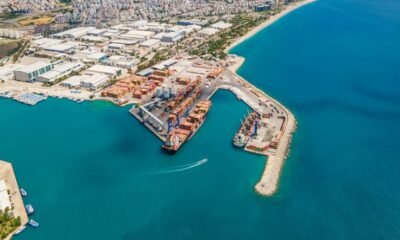
 Economy2 days ago
Economy2 days agoExport surge reflects stronger Türkiye-Italy trade relations
-

 Daily Agenda2 days ago
Daily Agenda2 days agoUN: Children in Gaza may die of thirst
-
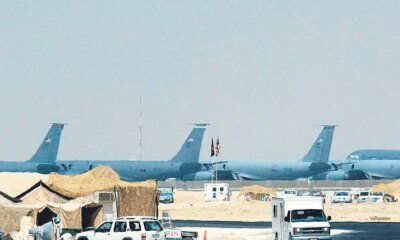
 Daily Agenda2 days ago
Daily Agenda2 days agoIran informed the USA before the base hit the base
-
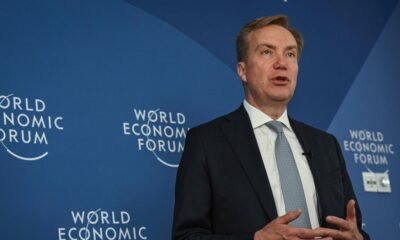
 Economy2 days ago
Economy2 days agoWEF chief warns of ‘most complex’ geopolitical backdrop in decades
-
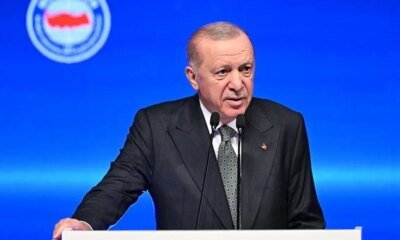
 Daily Agenda2 days ago
Daily Agenda2 days agoAttacks on Iran should not turn into disaster – Breaking News
-
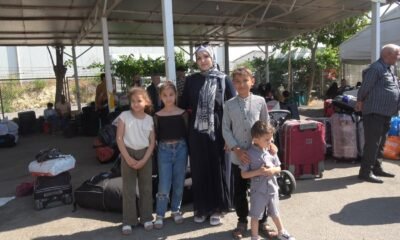
 Politics2 days ago
Politics2 days agoSyrians leaving Türkiye eager to grow their homeland
-
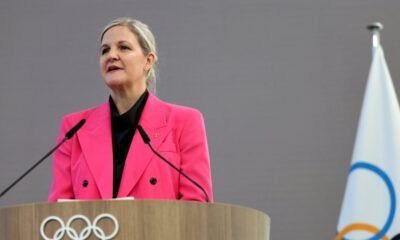
 Sports2 days ago
Sports2 days agoKirsty Coventry inaugurated as new IOC president for 8-year term




